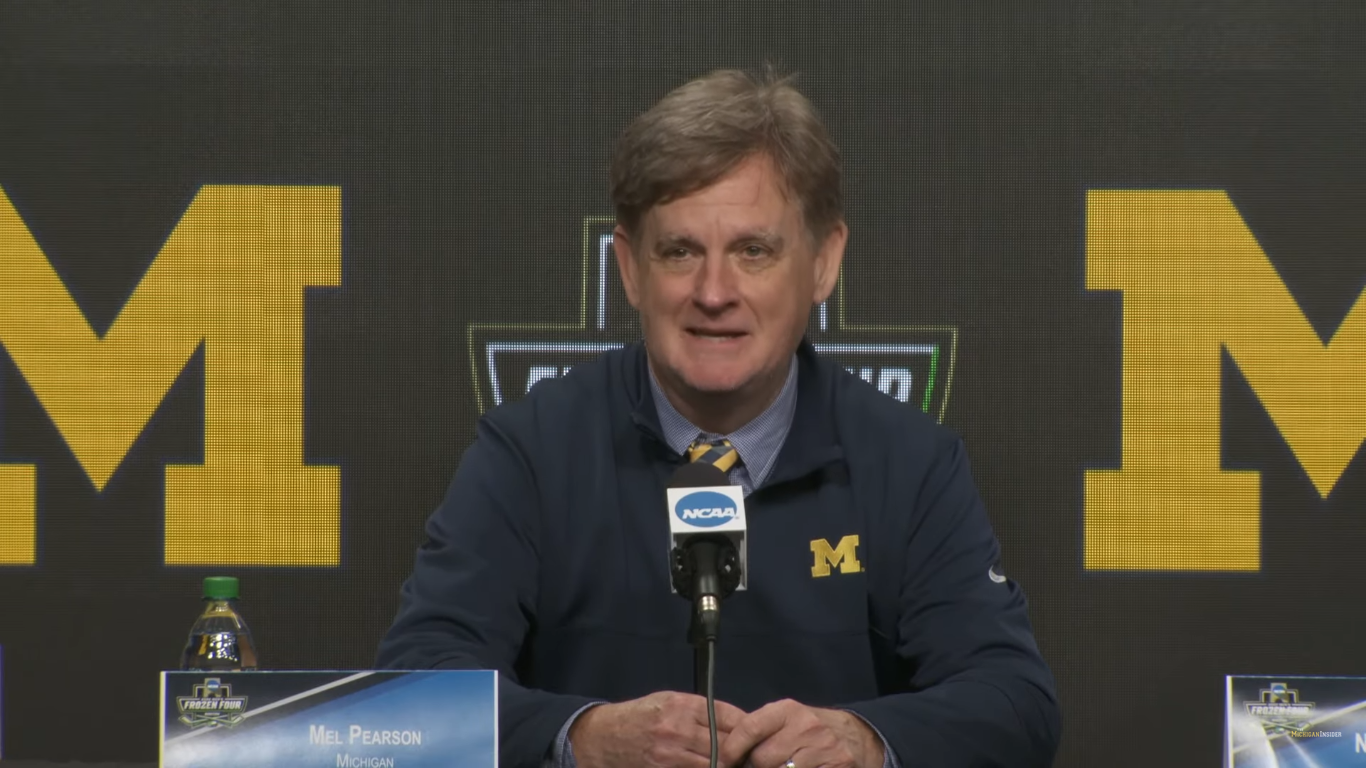It took a weirdly long time for the decision to become official, but on Friday, the University of Michigan announced that its hockey coach of five years, Mel Pearson, would not be coming back next season. The move—or non-move, really, as Pearson's contract had recently expired—came several days after the law firm WilmerHale's report illuminating culture problems in the program became public. That Pearson held on for as long as he did, and that the allegations in the report were made in the first place, made for yet another embarrassment at a school that has again and again struggled with both the existence of employee misconduct and its subsequent handling of those issues.
Pearson was a longtime assistant coach at Michigan, from 1988 to 2011, before leaving to take the head job at Michigan Tech. When Red Berenson announced his retirement in 2017, after 33 seasons leading the Wolverines, Pearson was an obvious choice to succeed him. After a series of underachieving campaigns from a regularly talented roster, Pearson took Michigan to the Frozen Four in his very first season, had championship hopes derailed by COVID infections in 2021, and made it back to the Frozen Four in 2022 with a roster headlined by four of the top five picks in the most recent NHL Draft. But Pearson's success in the spotlight masked deeper issues in the program he was running, according to the WilmerHale report, which you can read in full here.
The investigation was prompted by a complaint filed in October by former Michigan goalie and volunteer assistant Steve Shields, who said he was fired by Pearson as retaliation for raising concerns about the program. Those concerns included Pearson instructing students to lie on their COVID-19 tracing forms ahead of the NCAA Tournament they eventually had to withdraw from due to an outbreak; mistreatment of women working with the hockey program by Pearson and director of hockey operations Rick Bancroft; and the continued employment by the athletic department of people who knew about the abuse committed by former school doctor Robert Anderson at the time it was happening.
Among the findings in the report were statements from several witnesses who said Bancroft "bullied colleagues, possibly based on their gender, and that (Pearson) was aware of this behavior but took no action to stop.” Additionally, the report also outlined "pervasive fears among both student athletes and staff members of retaliation by (Pearson) for raising issues." Also noted were what the report called Pearson's "inconsistencies" in recalling or characterizing incidents compared to the other interviewees, which led to the report labeling his answers to investigators' questions "not credible."
The report came to the somewhat roundabout conclusion that Shields' firing was not in violation of the University's policy against retaliation; it found that Pearson fired him because he believed Shields was working to undermine his leadership, and not for the specific complaints. Though Pearson is exonerated by this narrow reading, the report still said that “issues facing the hockey program require attention” and “despite prior efforts to assess and respond to allegations regarding the culture of the program, additional work remains to be done.” It's difficult to read it without coming to the conclusion that, despite highly competitive play on the ice, Michigan hockey was a dysfunctional program that harmed athletes' mental health and failed to provide a welcoming place to work for its employees.
Bancroft retired from his position on June 20, but Pearson stayed on amid the investigation even though he had been working without a contract since the beginning of May. That should have made it easy to cut ties with him before this report became public, or even right after, but it was not until the end of the week that the coach was formally cut loose. This was because, per U-M author and historian John U. Bacon, Pearson still had a powerful ally in the athletic department.
More sources: the status of UM hockey coach Mel Pearson has now been reduced to a stand-off between the Regents (8-0) and interim pres. Mary Sue Coleman on one side, and Pearson and UM AD Warde Manuel (who earlier this week wanted to sign Pearson to an extension) on the other.
— John U. Bacon (@Johnubacon) August 4, 2022
It seems as though Manuel eventually relented to the pressure, but the support he apparently showed for his guy dampens any hopes that there is will for real change in the program or its athletic department. Michigan was slow to respond to the claims of past abuse against Dr. Anderson, has failed to reckon with school icon Bo Schembechler's role enabling that scandal, lost its Provost in 2020 after a lengthy history of sexual harassment came to light, and just suffered the embarrassment of former president Mark Schlissel's oafish flirtations with his subordinate, which led to his removal.
As story after story of various forms of misconduct at Michigan emerge, shedding a couple of hockey employees is unlikely to fix the deeper problems in Ann Arbor. In fact, the arduous and unconventional road to Pearson's departure shows just how tough it is to make such change happen. The school couldn't even make a clean break from a contractless coach, one who failed in every aspect of his job except "win games." Some public pressure may be relieved for the time being, but what will Michigan's leaders actually do to make this stop?





